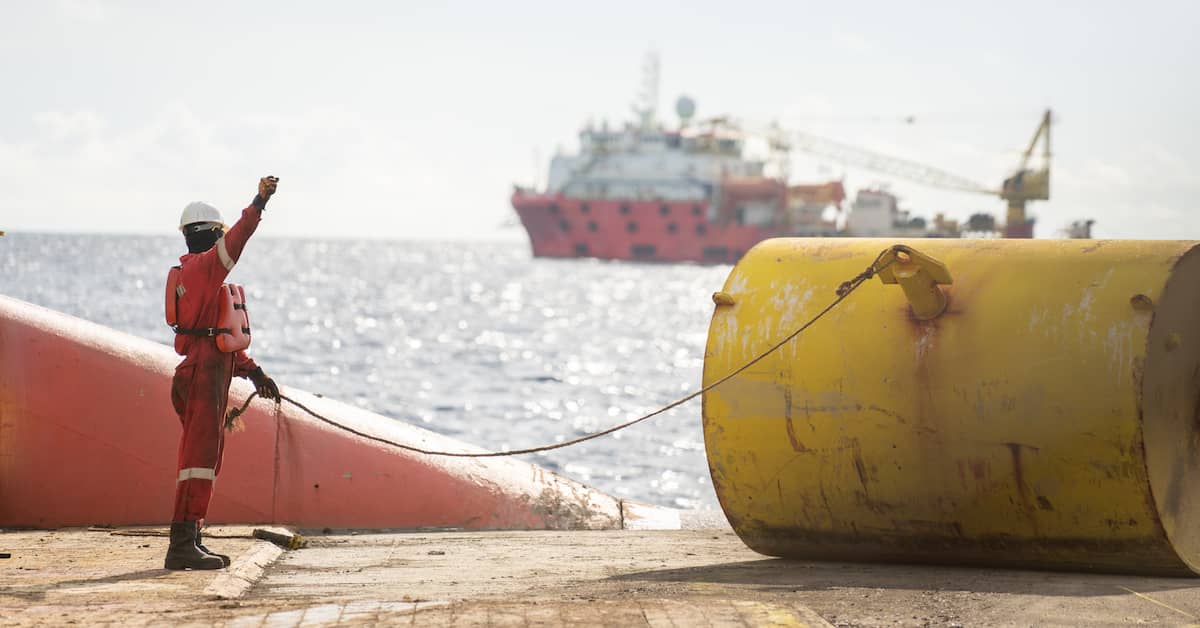
The open sea and inland waterways used for commerce are considered “navigable waters” of the United States. Navigable waters are governed by a collection of laws and codes collectively known as maritime law.
Maritime law (also known as admiralty law) provides important protections for those who work on navigable waters, as well as passengers aboard vessels. However, maritime law is very complicated. As such, it is extremely important to seek knowledgeable legal counsel if you were injured or a loved one was killed on the open sea or inland waters governed by federal law.
Patrick Daniel Law has extensive experience in the complexities of maritime injury claims. Know your rights under maritime law by contacting us today for a FREE case review.
The majority of workers on land can turn to state-administered workers’ compensation programs if they suffer an injury at work or develop a work-related illness. If you work on navigable waters, however, the rules are different.
Maritime law is the only recourse maritime workers have if they are hurt on the job. Both the process of recovering compensation and the compensation available for a work-related injury under maritime law are different from filing a claim for workers’ comp.
One of the most important components of maritime law in the United States is the Jones Act (or the Merchant Marine Act of 1920, to use the complete official name). The Jones Act established the right of maritime workers to “maintenance and cure” for job-related injuries and illnesses:
Sailors, offshore workers, and other workers covered by the Jones Act (known as seamen) are entitled to maintenance and cure. Employers are required to pay benefits for maintenance and cure until the worker reaches maximum medical improvement.
Maintenance and cure are provided on a no-fault basis. This means that maritime employers are required by law to make these payments regardless of who may be responsible for the worker’s injury.
Unlike state workers’ compensation laws (which typically bar injured workers from suing employers), the Jones Act also allows seamen to sue their employers if negligence was a factor in the injury or accident. Specifically, employers can be held liable if their negligence (however small) makes a vessel “unseaworthy.”
A vessel may be considered unseaworthy (and the shipowner liable) for any number of issues that cause harm to workers, including:
If it can be proved that an employer’s negligence led to injury or illness, seamen can bring a Jones Act claim for damages. You may be entitled to compensation for the following losses:
Families of workers killed in maritime accidents can also bring claims for wrongful death damages. Negligence/unseaworthiness must be proved for the worker’s surviving loved ones to recover compensation.
Originally passed in 1927 and amended multiple times since then, the Longshore and Harbor Workers’ Compensation Act (LHWCA) created a federal workers’ compensation program for “employees in traditional maritime occupations such as longshore workers, ship-repairers, shipbuilders or ship-breakers, and harbor construction workers” performing work in or adjoining navigable waters. If you or a loved one has been injured while working on a dock, pier, wharf, shipyard, or maritime terminal, you may be entitled to compensation under the LHWCA.
Benefits available under the Longshore and Harbor Workers’ Compensation Act include:
LHWCA benefits are provided on a no-fault basis, meaning workers and their families do not have to prove that negligence was a factor in the injury or accident. (Generally, employees covered by the LHWCA cannot sue their employers.) If a third party was negligent, however, additional compensation may be recovered through a separate claim provided the evidence demonstrates that one or more third parties were at fault.
Passengers of vessels on the navigable waters of the United States also have rights under maritime law if they suffer injury or illness. The location of the accident is crucial for determining whether a claim falls under state law or maritime law.
The right of passengers to recover damages for personal injury is an established part of maritime common law. Negligence on the part of a shipowner, the company operating the ship, and/or a third party must be established for a claim to be viable.
Different laws apply in the event of a passenger’s wrongful death aboard a seafaring vessel. If the death occurs no more than 3 nautical miles from the shore, the personal injury law of the state applies. Meanwhile, the Death on the High Seas Act applies if the death occurs more than 3 nautical miles from the U.S. shoreline.
Enacted in 1920, the Death on the High Seas Act (DOHSA) is a federal statute that provides rights to families who lose loved ones to accidents at sea as a result of negligence. The principle application of the DOHSA today is incidents where passengers die on cruise ships that are out to sea.
Under the DOHSA, eligible survivors (such as spouses, children, parents, and other relatives dependent on the deceased) can recover damages for pecuniary loss (i.e., economic damages) only. In effect, survivors can only obtain compensation for loss of financial support provided by the decedent prior to death and any funeral or medical expenses paid by the survivors.
The decedent’s estate is not entitled to compensation for funeral expenses and medical bills under the DOHSA. In addition, family members cannot recover for non-economic damages such as loss of companionship and consortium, loss of parental guidance, and the pain and suffering of the deceased prior to death.
If a member of your family was killed at sea, the Death on the High Seas Act does allow you to pursue recovery of economic damages. Recoverable compensation for such a loss may be substantial. However, it is important to assess all of your legal options to determine if a separate claim can be brought for recovery of expenses incurred by the decedent prior to death as well as non-economic losses.
In general, maritime law applies to incidents that occur in navigable waters. According to 33 CFR § 329.4, navigable waters are “those waters that are subject to the ebb and flow of the tide and/or are presently used, or have been used in the past, or may be susceptible for use to transport interstate or foreign commerce.” Navigable waters may include oceans, lakes, rivers, or any other body of water that could be used for commerce.
However, maritime law doesn’t just apply to injuries suffered on navigable waters. It can also apply to certain land-based incidents. For instance, maritime law may apply to activities related to:
Any land-based activity closely related to maritime operations or that takes place near navigable waters may be considered to fall under maritime law. Maritime law aims to unite all activities involving maritime commerce under a common set of rules or laws.
Maritime law, also known as admiralty law, is a specialized legal system that governs activities and disputes occurring on the high seas and other navigable waters. It encompasses a wide range of legal principles, rules, and regulations governing various aspects of maritime commerce, navigation, and marine activities.
Maritime law addresses several key areas, including maritime trade, shipping, marine insurance, salvage, maritime contracts, and personal injuries that occur at sea. It covers both domestic and international waters and deals with legal matters involving ships, cargo, seafarers, and other parties involved in maritime operations.
The primary objective of maritime law is to provide a comprehensive set of laws that ensures the smooth functioning and regulation of maritime activities. It aims to establish clear guidelines and standards for businesses, maintain safety and security at sea, protect the rights and interests of parties involved, and resolve disputes that arise in the maritime domain.
United States maritime law lays down essential rights for seamen, longshore and harbor workers, and passengers of vessels. Maritime law is highly complex and draws upon principles from various legal systems, including common law and international conventions. Due to the complexity of maritime cases, hiring an experienced maritime injury lawyer is in your best interest.
Maritime laws are necessary for several reasons. Given the unique nature of maritime operations, which often involve international waters and multiple jurisdictions, maritime laws establish rules and standards that facilitate global trade and ensure consistency in legal practices.
However, we find that the importance of maritime law is most evident in its aim to protect people. Maritime laws help maintain safety and security at sea. They set forth regulations for vessel construction, equipment, and operation, aiming to prevent accidents, protect human life, and safeguard the marine environment.
Maritime laws protect the rights and interests of workers and passengers involved in maritime activities. They define legal relationships between shipowners, crew members, cargo owners, insurers, and more, ensuring fair treatment, contractual obligations, and the resolution of disputes through established legal mechanisms.
Oftentimes, maritime law serves as the sole legal avenue for maritime workers seeking recourse in the event of a work-related injury. The process to pursue compensation for your injuries in a maritime case differs from that of a typical workers’ compensation claim.
In cases where maritime workers suffer injuries while performing their job duties, maritime law provides the legal framework for seeking compensation. Unlike traditional workers’ compensation claims, which fall under state laws, maritime law governs injuries sustained in navigable waters and at sea.
Recovering compensation for work-related injuries involves determining the applicable jurisdiction, establishing the nature and extent of the injury, and identifying the responsible parties. Maritime law offers multiple avenues for pursuing compensation, such as maintenance and cure benefits, the Jones Act, the Longshore and Harbor Workers’ Compensation Act (LHWCA), or the Death on the High Seas Act (DOHSA).
If you’ve been injured or a loved one has been lost in an accident on navigable waters or while working in a maritime-related position, call a maritime injury lawyer as soon as you are able. There is no need to suffer additional stress and strain due to the complexities of the legal system when you need to focus on healing.
The U.S. Coast Guard will oversee and enforce maritime law in the waters of the United States. However, if there is an incident in international waters, the authority would be given to the flag country (the flag that the watercraft is flying) or the country of the closest shore if the boat is not flying the flag of its land.
Identifying the appropriate jurisdiction(s) can be confusing. There are enough variables in an incident at sea or on navigable waters to overwhelm you. For help with your claim, contact an experienced maritime lawyer. At Patrick Daniel Law, we can help handle the difficult details while you focus your energy and attention on healing.
Some do. Rivers can indeed fall under maritime law. However, they are subject to certain conditions based on their navigability and connectivity to broader interstate or international water systems.
Maritime or admiralty law governs the high seas and all navigable waters. Rivers themselves can be classified as navigable if they are capable of being used as public highways for trade, commerce, and travel between states or foreign countries. They can also fall under maritime jurisdiction if connected to a navigable body of water.
Non-navigable waterways are not subject to maritime law. These typically include smaller lakes, rivers, or streams entirely within a single state and from which you cannot travel to any other state, country, ocean, or navigable waterway.
The technical distinction between navigable and non-navigable rivers and lakes can be confusing and is often at the discretion of each court. Hiring a knowledgeable maritime lawyer to help navigate your case’s legal ins and outs is advisable.
Some common personal injuries that occur while at sea include the following:
Depending on the avenue you use to pursue compensation after you are injured, you may be able to recover damages for the following:
The importance of maritime law is clear in cases where someone has been injured. When a person suffers pain and losses due to an incident on navigable waters, it can be challenging to understand who is responsible and how they may seek compensation for their damages. Maritime law and maritime lawyers help balance the scales and find victims the justice they deserve.
The maritime law of the United States provides important rights to seamen, longshore and harbor workers, and passengers of vessels. Unfortunately, recovering compensation for injuries and wrongful death can be extremely challenging. In some cases international law may take precedence, which can make it even more difficult to bring a claim.
You need a lawyer who understands the complexities of maritime law and how to fight for the compensation you deserve. Attorney Patrick Daniel is recognized as a leader in the field of maritime injury and accident litigation. Patrick Daniel Law is Strategic, Meticulous, and Merciless. We thoroughly review the facts of your case, develop a personalized legal strategy, and relentlessly pursue maximum recovery on your behalf.
Please call Patrick Daniel Law at (713) 999-6666 today for a FREE case evaluation. Our maritime injury lawyer serves clients in and around Houston, all of Texas, and nationwide and worldwide.
 Top Truck Accident Lawyer in Pasadena
Top Truck Accident Lawyer in Pasadena Best of The Best Attorneys
Best of The Best Attorneys Best of the Best Houston Chronicle 2021
Best of the Best Houston Chronicle 2021 Best Motorcycle Accident Lawyers in Houston 2021
Best Motorcycle Accident Lawyers in Houston 2021 American Association for Justice Member
American Association for Justice Member The National Trial Lawyers 2016 – (Top 40 under 40)
The National Trial Lawyers 2016 – (Top 40 under 40) Multi-Million Dollar Advocates Forum 2016 (Top Trial Lawyer)
Multi-Million Dollar Advocates Forum 2016 (Top Trial Lawyer) Million Dollar Advocates Forum 2019 (Top Trial Lawyer)
Million Dollar Advocates Forum 2019 (Top Trial Lawyer) America’s Top 100 Attorneys 2020 (High Stake Litigators)
America’s Top 100 Attorneys 2020 (High Stake Litigators) Lawyers of Distinction 2019, 2020 (Recognizing Excellence in Personal Injury)
Lawyers of Distinction 2019, 2020 (Recognizing Excellence in Personal Injury) American Institute of Personal Injury Attorneys 2020 (Top 10 Best Attorneys – Client Satisfaction)
American Institute of Personal Injury Attorneys 2020 (Top 10 Best Attorneys – Client Satisfaction) American Institute of Legal Advocates 2020 (Membership)
American Institute of Legal Advocates 2020 (Membership) Association of American Trial Lawyers 2018 - Top 100 Award recognizing excellence in personal injury law
Association of American Trial Lawyers 2018 - Top 100 Award recognizing excellence in personal injury law American Institute of Legal Professionals 2020 (Lawyer of the Year)
American Institute of Legal Professionals 2020 (Lawyer of the Year) Lead Counsel Verified Personal Injury 2020
Lead Counsel Verified Personal Injury 2020 The Houston Business Journal 2021
The Houston Business Journal 2021